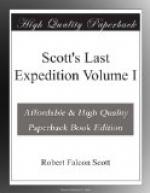Saturday, March 3.—Lunch. We picked up the track again yesterday, finding ourselves to the eastward. Did close on 10 miles and things looked a trifle better; but this morning the outlook is blacker than ever. Started well and with good breeze; for an hour made good headway; then the surface grew awful beyond words. The wind drew forward; every circumstance was against us. After 4 1/4 hours things so bad that we camped, having covered 4 1/2 miles. (R. 46.) One cannot consider this a fault of our own—certainly we were pulling hard this morning—it was more than three parts surface which held us back—the wind at strongest, powerless to move the sledge. When the light is good it is easy to see the reason. The surface, lately a very good hard one, is coated with a thin layer of woolly crystals, formed by radiation no doubt. These are too firmly fixed to be removed by the wind and cause impossible friction on the runners. God help us, we can’t keep up this pulling, that is certain. Amongst ourselves we are unendingly cheerful, but what each man feels in his heart I can only guess. Pulling on foot gear in the morning is getter slower and slower, therefore every day more dangerous.
Sunday, March 4.—Lunch. Things looking very black indeed. As usual we forgot our trouble last night, got into our bags, slept splendidly on good hoosh, woke and had another, and started marching. Sun shining brightly, tracks clear, but surface covered with sandy frostrime. All the morning we had to pull with all our strength, and in 4 1/2 hours we covered 3 1/2 miles. Last night it was overcast and thick, surface bad; this morning sun shining and surface as bad as ever. One has little to hope for except perhaps strong dry wind—an unlikely contingency at this time of year. Under the immediate surface crystals is a hard sustrugi surface, which must have been excellent for pulling a week or two ago. We are about 42 miles from the next depot and have a week’s food, but only about 3 to 4 days’ fuel—we are as economical of the latter as one can possibly be, and we cannot afford to save food and pull as we are pulling. We are in a very tight place indeed, but none of us despondent yet, or at least we preserve every semblance of good cheer, but one’s heart sinks as the sledge stops dead at some sastrugi behind which the surface sand lies thickly heaped. For the moment the temperature is on the -20 deg.—an improvement which makes us much more comfortable, but a colder snap is bound to come again soon. I fear that Oates at least will weather such an event very poorly. Providence to our aid! We can expect little from man now except the possibility of extra food at the next depot. It will be real bad if we get there and find the same shortage of oil. Shall we get there? Such a short distance it would have appeared to us on the summit! I don’t know what I should do if Wilson and Bowers weren’t so determinedly cheerful over things.




